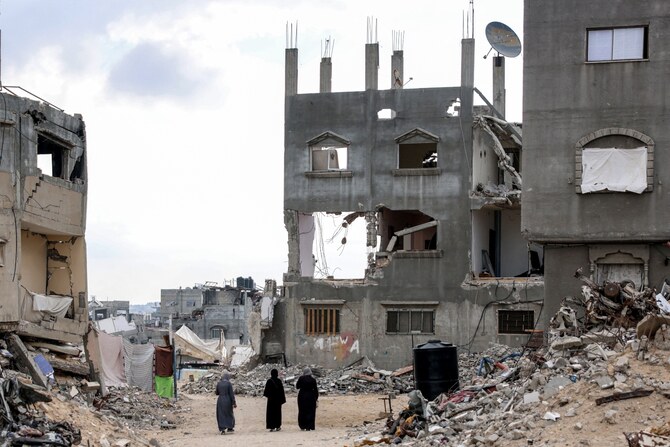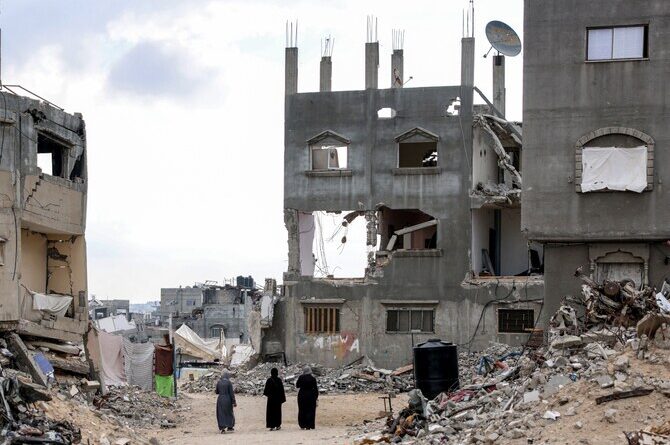Mental health problems: The hidden price of war
Mental health problems: The hidden price of war

As the sun rises over Gaza, it illuminates a region marked by destruction and hopelessness. A great loss. The elimination of any sign that normal life is being carried on. It is an event that few of us can recognize. It could be the far side of the moon.
But this is not a distant planet. The narrow strip of land along the shores of the Mediterranean, where tens of thousands of tons of bombs have been dropped, is one of the most densely populated areas on Earth.
The effects of conflict reverberate through the remains of every street and house, into every heart and mind. For more than 2 million people living in this region – and in similar areas in countries such as Lebanon, Somalia, Sudan, the Syrian Arab Republic and Yemen – daily life is not just a struggle to survive against physical dangers . It is a battle against the intense stress that instability and exposure to violence causes.
My part of the world, the Eastern Mediterranean region, is home to 40 percent of the world’s population in need of humanitarian assistance. It hosts 55 percent of the world’s refugees. Almost half of the region’s countries face long-term emergencies, which increase the risk of their citizens developing mental, neurological and substance abuse problems. Among these staggering statistics, it is important to understand the human cost of conflict.
The prevalence rate of mental illness in this region is much higher than the global average
Dr. Hanan Balky
People affected by emergencies experience severe anxiety, which manifests as worry, sadness, fatigue and irritability. More than one in five people will develop mental health conditions, including post-traumatic stress disorder, depression and schizophrenia. 1 in 11 people will have a condition so severe that it impairs their ability to function in these critical situations.
How do you cope when falling bombs replace the sounds of children playing in the street? While every day must be spent searching for water and food necessary for survival. When you breathe in a miasma of sewage that will never be treated but instead flows into the streets. When medical care is impossible to access, leaving injuries untreated and diseases getting worse.
And you don’t have to dig through tons of rubble to look for lost loved ones. As the children are orphaned and crippled every day. When childhood itself is turned into a terrible struggle for survival. How can the experience of witnessing such destruction, of losing mothers, fathers, sisters and brothers, not leave a lasting impression on growing minds? How will they recover? How can you deal with this situation?
The prevalence rate of mental illness in the Eastern Mediterranean region is much higher than the global average, and the difference is almost entirely due to the prevailing emergency conditions. However, as demand for mental health and psychological support rises, the capacity of health and social care services to provide support is deteriorating, leaving a gap of up to 90 percent for treatment of mental, neurological and substance use disorders. .
In Lebanon, the situation is rapidly spiraling out of control. After years of severe economic stress – exacerbated by the 2020 port explosion and the arrival of 1 million Syrian refugees to settle among Lebanon’s 4 million population – it has been reported that people more than 1,900 have been killed and more than 9,000 injured since then. October 2023, when health centers are attacked again.
Recognizing the urgent need for mental health services, the Lebanese government has worked to strengthen its mental health infrastructure and improve services that assist refugees and local residents. This commitment to mental health encourages community empowerment. In the midst of growing chaos, it offers a way of life of hope.
Citizens of conflict-affected countries deserve more than a chance to survive; they deserve a chance to succeed
Dr. Hanan Balky
In Sudan, the simplest tasks – collecting food and water – are fraught with danger. For many, the world outside their door has been turned into a scary place. The threat of gender-based violence has left millions of women and girls trapped in the web of fear, and has created an invisible prison. Not only must we recognize the deep psychological wounds caused by this relentless cycle of violence, we must act to restore freedom and independence to its victims.
The mental anguish and stress that plagues Gaza, Lebanon and Sudan is felt throughout Somalia, the Syrian Arab Republic and Yemen, affecting millions of innocent civilians.
As we celebrate World Mental Health Day on Thursday, it’s also important to recognize the dedication and commitment of health workers across the region, who are the frontline providers of care. They are risking their lives, and in many cases, their lives while supporting the most vulnerable in their communities. Often lacking in what they desperately need, they continue to struggle against the tides of despair.
They deserve our heartfelt appreciation and unwavering support, including access to mental health resources that can help them maintain their health.
Investing in mental health is a strategic imperative. The World Health Organization is committed to promoting mental health and psychosocial support systems and integrating them into all levels of health and social care. Our efforts range from building local capacity for low-impact interventions such as mental health first aid to providing services to those with severe mental health conditions and essential medications. psychotropic. But the scale of the problems is very big. There is much to be done.
Citizens of conflict-affected countries deserve more than a chance to survive; they deserve a chance to succeed. By addressing their needs, we empower individuals and communities to redeem their lives and contribute to improving the lives of all of us.
We cannot wait until the dust settles. We urgently need to develop new ways to support citizens and governments in need.
But more than this, more than anything, we need peace to live.
In our world, we have become very familiar with the harsh conditions of war and its profound effect on mental health, not only for those who live in nightmares but also for those who see them almost on screens. and mobile devices. Collective tragedy has shaped our collective consciousness, reminding us that the wounds of conflict extend far beyond the battlefield.
Let us take concrete action and invest in the welfare of those affected by conflict and disaster. Only then can we create a future where everyone has the opportunity to heal, thrive and contribute to a peaceful society.
The time to act is now. The ruins were impassable.
- Dr. Hanan Balky is the World Health Organization’s Regional Director for the Eastern Mediterranean.
Disclaimer: The views expressed by the authors in this section are their own and do not necessarily reflect the views of Arab News.
#Mental #health #problems #hidden #price #war
